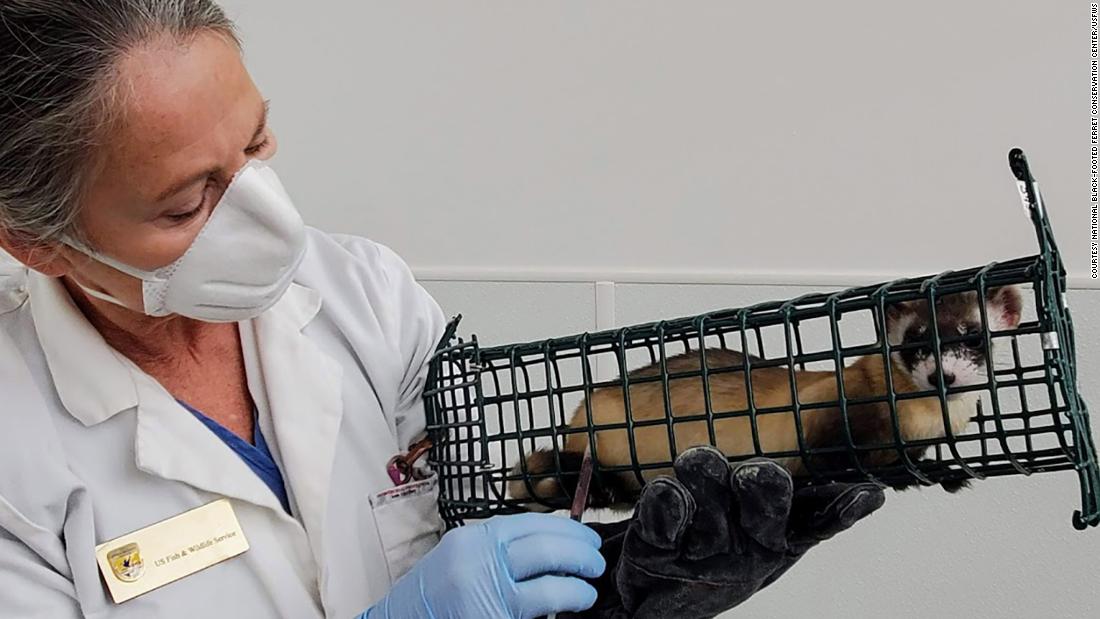
About 120 black-footed ferrets, one of the most endangered mammals in North America, were injected with an experimental Covid-19 vaccine to protect the tiny, weasel-like creatures rescued from the brink of extinction four decades ago.
Vaccinating such vulnerable species against the disease is important not only for the welfare of the animals, experts say, but possibly also for the protection of humans. Some of the most pernicious human diseases originated in animals, including the new coronavirus, which is believed to have spread from bats to an intermediate species before hopping on humans and causing the pandemic.
“For highly contagious respiratory viruses, it is very important to consider the animal reservoir,” says Dr. Corey Casper, a vaccinologist and chief executive of the Infectious Disease Research Institute in Seattle. “If the virus returned to the animal host and mutated or changed in such a way that it could be reintroduced into humans, the humans would no longer have that immunity. That worries me a lot.”
“We have no direct evidence that black-footed ferrets are susceptible to COVID-19, but given their close relationship to mink, we wouldn’t want to find out,” Rocke said.
Rocke began working on the experimental vaccine in the spring, when she and Pete Gober, coordinator for black-footed ferret recovery for the U.S. Fish and Wildlife Service, watched reports of the new coronavirus with growing alarm. An exotic disease is “the greatest nemesis for ferret recovery,” says Gober, who has worked with black-footed ferrets for 30 years. “It can bring you back to zero.”
Ferrets are a native species that once roamed vast areas of the American West. Their ranks declined rapidly over many decades as populations of prairie dogs, the ferrets’ main source of food and shelter, were decimated by farming, grazing, and other human activities.
Black-footed ferrets were declared extinct in 1979 – until a small population was discovered on a Wyoming ranch. Most of those rare animals were subsequently lost to disease, including Sylvatic Plague, the animal version of the Black Death that has ravaged humans. The species survived only because biologists rescued 18 ferrets to provide the basis for a captive breeding program, Gober said.
Would the same technique work against the virus that causes Covid-19? Under the Fish and Wildlife Service’s investigative authority, the scientists were free to try it.
“We can do things like this experimentally in animals that we can’t in humans,” Rocke noted.
Rocke purchased purified SARS-CoV-2 virus protein from a commercial manufacturer. She mixed the liquid protein with an adjuvant, a substance that boosts the immune response, and injected it under the animals’ skin.
The first doses were given in late spring to 18 black-footed ferrets, all male, all about one year old, followed by a booster dose a few weeks later. Within weeks of getting the second injections, tests of the animals’ blood showed antibodies to the virus, a good – and expected – sign.
By early fall, 120 of the 180 ferrets housed at the center had been vaccinated, while the remainder remained unvaccinated in case something went wrong with the animals, which generally live in captivity for four to six years. So far the vaccine appears to be safe, but there is no data yet to show whether it protects animals against disease. “I can tell you, we have no idea if it will work,” said Rocke, who plans to run efficacy testing this winter.
But Rocke’s effort makes sense, said Casper, who has created several vaccines for humans. Rocke’s approach – introducing an inactivated virus to an animal to stimulate an immune response – is the basis for many common vaccines, such as vaccines that prevent polio and influenza.
Gober said he is optimistic that the ferrets will be protected, but it takes a well-designed study to resolve the question. Until then, he’s working to keep the vulnerable ferrets free of Covid-19. The price of peace is eternal vigilance, they say. We cannot let our guard down. ‘
The more difficult task is to do the same for people, Gober noted.
“We just hold our breath, hoping we can get all the people in the country vaccinated. That will give us all a sigh of relief. ‘
KHN (Kaiser Health News) is a non-profit news service about health issues. It is an editorially independent program from KFF (Kaiser Family Foundation) which is not affiliated with Kaiser Permanente.
